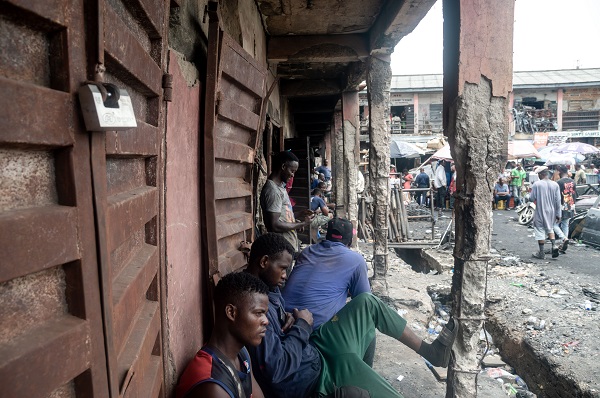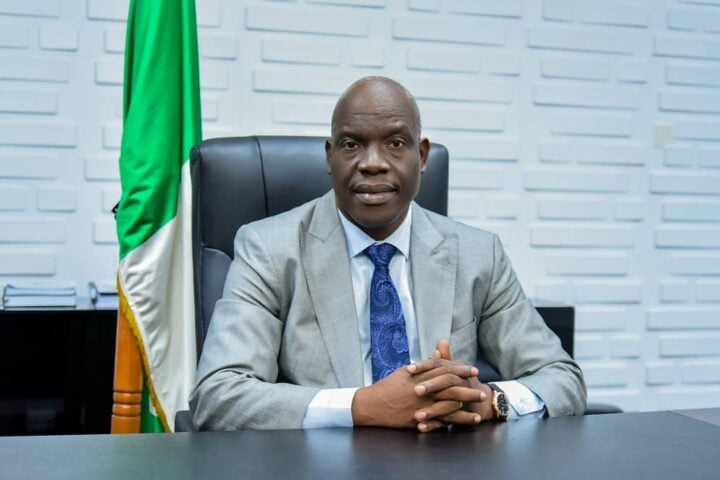After a slow business day on February 25, 2022, Johnson Bright went home to spend the rest of the evening with his family. Later that night, he started to receive more phone calls than usual. It was past 11pm and Bright didn’t like to take calls at odd hours. So, he ignored the phone. But it kept buzzing till about 5am and when his wife handed the phone to him, it was not a social call.
“I ran to the market half-naked when I heard it was on fire,” he said.
Bright lives in Ejigbo, which is 8.6km to his shop at Ladipo International Spare Parts Market when commuting through Egbe road. The fire lasted till the next morning.
Two major buildings where fairly used engines and other spare parts are sold were affected. One of the buildings collapsed, while the other was in bad shape. The buildings, known as ‘Hassan Ola’ and ‘Never Give Up’, make up 174 shops located at Aguiyi Ironsi street in the market.
Advertisement
“I lost over N10 million — everything I laboured for since I came to Lagos, served my master, and started my own,” Bright said as he sat in the rubble where his means of livelihood once stood.
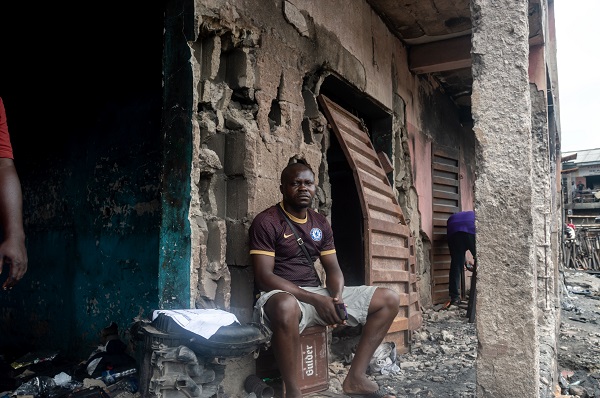
Bright, 35, is a product of the Igbo apprenticeship tradition — an entrepreneurship system where a young male of south-east extraction embarks on a business journey by first serving those they call ‘masters’ (usually older or more experienced males in business). The system requires that the ‘master’ provides start-up capital for ‘the servant’ to help him start his own business after an agreed period of service.
For Bright, the most painful thing about the inferno was going through the system for six years only to end up losing his five-year-old business in one night.
Advertisement
“I don’t know where to start. They say people are committing suicide here and there, but I don’t believe that is the way,” he told TheCable.
“I’m pleading with anybody out there, the government, if they can assist, they should come and assist us.”
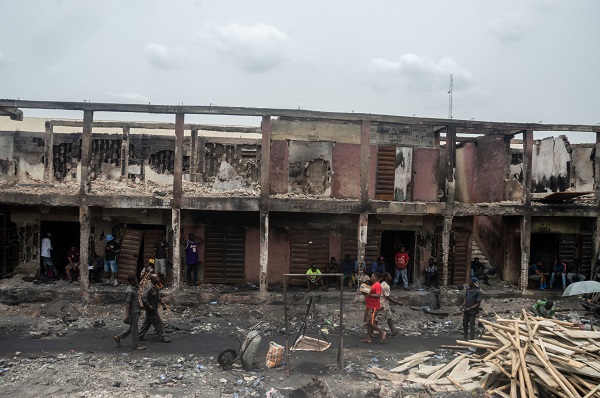
It has been four months since the inferno, but a recent visit to the affected area shows that no repair or reconstruction efforts are ongoing.
Victims said they are still trying to find a bearing, as many revealed that they were recovering from the impact of the COVID-19 pandemic when the fire occurred.
Advertisement
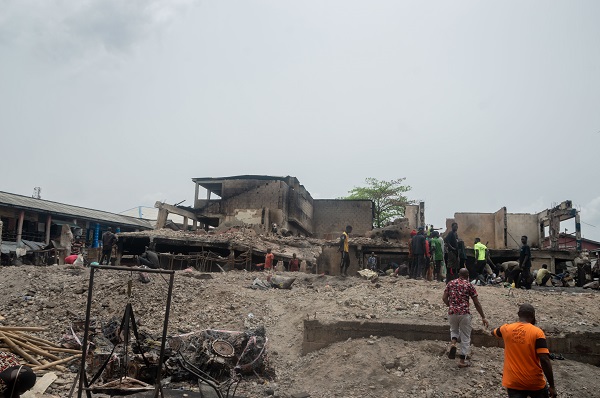
THE LOSSES
Somadina Azubugwu had offloaded goods on that fateful Friday, and the new arrivals were displayed outside. Save for a few items inside the shop, all the goods got burnt.
“The goods that were outside alone were up to N8 million. That was the estimated cost,” he said.
“It is too much. To tell you we’re devastated is an understatement.”
Advertisement
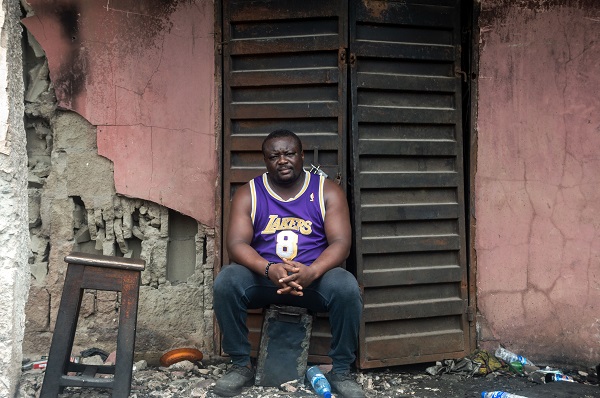
Titus Egbuonu said he had three shops in both buildings, adding that he lost an estimated N50 million worth of goods.
Similarly, Chukwudi Ikeomu said he lost about N12 million, noting that he had also imported new engines before the incident.
Advertisement
Emmanuel Mbamara, the unit chairman of Aguiyi Ironsi, Ladipo, said traders lost billions of naira to the fire. He said during a fact-finding exercise constituted in March, a trader said he lost “up to N600 million”, and another person said he lost “N200 million”. He also told TheCable that the losses included cash and property.
“The developer has almost sold out these shops to my members. One guy we call Stone owns about 21 shops there. The shops belong to us. People rented from members of the market that own the shops,” he said.
Advertisement
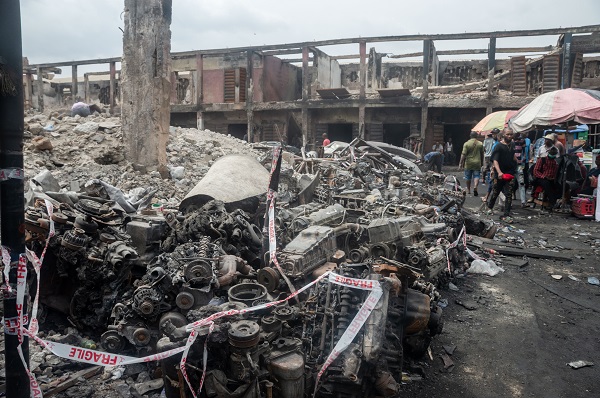
GOVERNMENT REVENUE IMPACTED
According to Mbamara, the Ladipo market is a money-spinner for both the state and local governments.
Advertisement
“I supervise the payment of storage fees. That money belongs to the local government,” he said but refused to disclose the amount paid.
However, a source who did not want to be named, said traders are charged N12,000 annually as storage fee.
“Every shop pays N12,000 every year. That is N1,000 every month. They say it goes to the local government,” the source said.
There were 140 shops and 34 shops in Hassan Ola, and Never Give Up plazas, respectively, before the incident. This means the LG may be on its way to losing at least N2.08 million annually.
WILL VEHICLE OWNERS BE HIT?
From interviews conducted with traders, there are speculations that vehicle owners may also feel the heat as one of the affected areas is known for “American spare parts”.
“It will affect them directly or indirectly,” a source said. “The scarcity of engines is all over and the people that have it will increase the price since we don’t have anymore.”
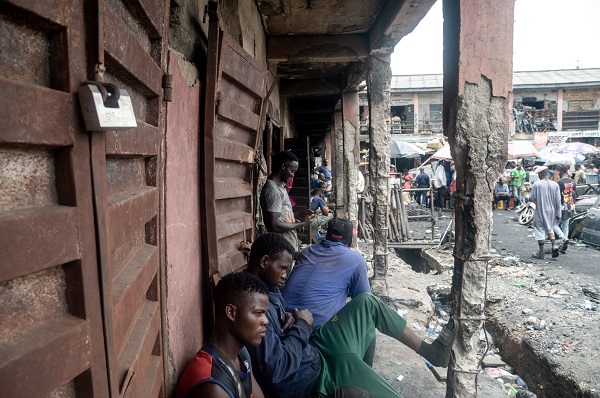
CAUSE OF FIRE STILL UNDISCLOSED
The actual cause of the incident is yet to be officially disclosed, but some traders believe it was started by individuals who are against the leaders of the market and clamouring for more shops to be built.
Prior to the day of the incident, there was said to be an electrical surge at a place called Akanchawa, but it was put out quickly. Interestingly, the fire was said to have started from the same location. Nonetheless, without proof, market authorities have linked the inferno to an electrical fault.
“I don’t want to accuse anyone without proof. So, I’m looking at electricity fluctuations as the cause,” Mbamara said.
However, another source said investigations have been concluded and the cause unravelled, but he declined to speak further.
“They’ve found out. We know what happened but we can’t say it. It’s money we’re looking for now because we’re hungry,” he said.
A HISTORY OF THE MARKET
The evolution of Ladipo market, according to an article authored by Ekanade Olumide, is a story of religion, commerce, and politics. A church community known as Aladura had occupied the area in the early 1950s. The land, according to Olumide, met the church’s spiritual needs, but a series of political events involving traditional rulers threatened its ownership. As a result, the community decided to lease portions of the land to Igbo traders who were already trickling into the area at the time.
“This would discourage encroachment by land grabbers who were threatening the community,” Olumide wrote.
Ladipo has since evolved into a market that is central to the sale, supply, and redistribution of vehicle spare parts to markets across Nigeria and West Africa.
Speaking on the importance of the market, Mbamara said it “keeps Nigeria and West Africa moving”.
“Shut down here for one week and people from Aso Rock, people from all parts of West Africa will be calling,” he said.
“And we’re employers of labour. There is no way you can erase the fact that Ladipo is so important in Lagos state.”
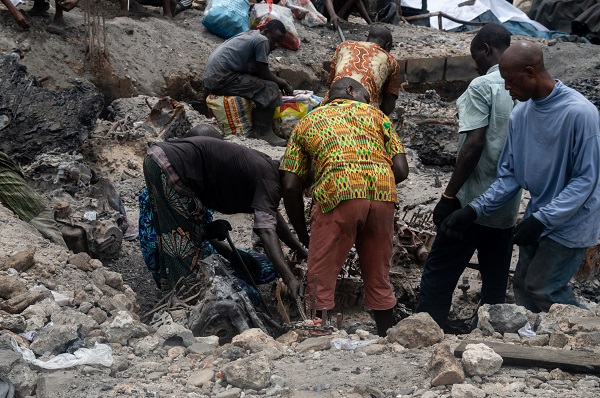
A HISTORY OF FIRE INCIDENTS — AND PRE-EMPTIVE MEASURES
Despite its crucial role in commerce in south-west, the market is not new to fire incidents. Data obtained by TheCable from the state’s fire and rescue show that there were a total of 128 fire calls from markets in the last five years. The highest number of calls (17) came from the mammy market, while 13 were from Ladipo.
However, the Lagos State Emergency Management Agency (LASEMA) said it would establish a mini fire station within the market to ensure faster response in the event of future incidents.
“We’re not talking about fire station in their market alone. We’re going to ensure we have a presence of response units in here and we’re going to train able-bodied persons from this market,” Olufemi Oke-Osanyintolu, permanent secretary, LASEMA, said.
LAGOS STATE FIRE & RESCUE SERVICE DATA ON MARKETS (2017 – 2022)
| S/N | MARKET | FIRE CALL |
|---|---|---|
| 1. | Alaba International Market | 6 |
| 2. | Alaba Rago Market | 2 |
| 3. | Computer Village Market | 1 |
| 4. | Idumota Market | 7 |
| 5. | Idi-Oro Market | 1 |
| 6. | Owode Onirin Market | 7 |
| 7. | Owode Elede Plank Market | 1 |
| 8. | Oko Baba Plank Market | 6 |
| 9. | Idi Araba Market | 1 |
| 10. | Mammy Market | 17 |
| 11. | Ladipo Market | 13 |
| 12. | Oduduwa Market | 1 |
| 13. | Powa Market | 4 |
| 14. | Ijora Market | 2 |
| 15. | Agunbiade Market, Pen Cinema, Agege | 1 |
| 16. | Iyana Itire Auto Spare Part Market | 1 |
| 17. | Jankara Market | 2 |
| 18. | Binukonu Modern Market, Ogudu | 2 |
| 19. | Trade Fair Market, Badagry | 5 |
| 20. | Ashade Market, Guiness Bus Stop, Agege | 1 |
| 21. | Agboju Market | 2 |
| 22. | Better Life Market, Makoko | 1 |
| 23. | Irewolede Market By Obawole, Ifako | 1 |
| 24. | Elegushi/Oniru Market | 2 |
| 25. | Jakande Retail Market, Ejigbo | 1 |
| 26. | Irepodun Market, Ikotun | 1 |
| 27. | Aswani Market | 1 |
| 28. | Shibiri Market, Ojo | 1 |
| 29. | Agboju Market, Festac Town | 2 |
| 30. | Iponri Market | 2 |
| 31. | Allison Market, Ikorodu | 1 |
| 32. | Agbalata Market, Badagry | 2 |
| 33. | Alayabiagba Modern Market, Mobil Rd. Ajegunle | 2 |
| 34. | Aguda Census Market | 1 |
| 35. | Agege Market Isokoko | 1 |
| 36. | Ojo Alaworo Market, Ojo | 1 |
| 37. | Idera Market, Mafoluku Oshodi | 1 |
| 38. | Sabo Modern Market, Yaba | 1 |
| 39. | Katangowa Market | 1 |
| 40. | Ajah Market | 1 |
| 41. | Tejuosho Market, Yaba | 2 |
| 42. | Olayele Market, Palmgrove | 1 |
| 43. | Flour Market, Odogunyan | 3 |
| 44. | Odua Market, Ikorodu Road | 1 |
| 45. | Ifelodun Market, Ketu | 1 |
| 46. | Alade Market, Shomolu | 1 |
| 47. | Ita Oluwo Market, Odogunyan | 1 |
| 48. | Sogidowo Plank Market, Itamaga, Ikorodu | 1 |
| 49. | Oshoyinbo Shopping Complex, Odogunyan | 1 |
| 50. | Trinity Bus Stop Market, Apapa | 1 |
| 51. | Abibat Mogaji Modern Market, Cairo Down Town, Oshodi | 1 |
| 52. | Afenifere Plank Market, Abule Ado | 1 |
| 53. | Akorede International Market, Adebadejo Street, Ijeshatedo | 1 |
| 54. | Jesu – Oyingbo Market | 1 |
| 55. | Ologogoro Plank Market, Musa St. Ijoko, Ogun State | 1 |
| 56. | Adediyan Isansan Market, Mosafejo | 1 |
| 57. | Asogbon Market, Bariga | 1 |
| 58. | Ikotun Market | 1 |
| Total | 128 |
REDUCING THE DEGREE OF DAMAGE
TheCable observed that the degree of losses could be linked to two factors: blocked roads within the market, and the “over-zealousness” of market security guards as victims said they stopped them from going in to salvage some goods when the fire started, to prevent looting.
Even though the state and federal firefighters arrived on time, they were also said to have been unable to access the market properly because of blocked roads.
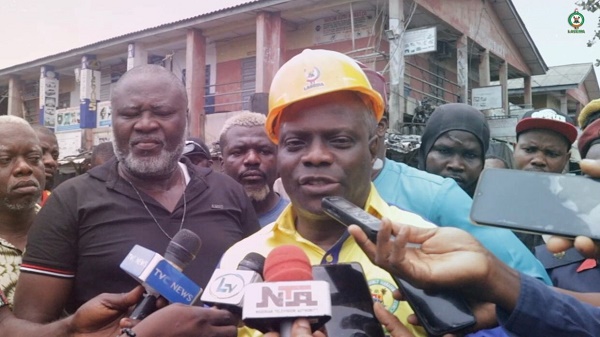
“The fire could not have gotten to this extent because it had not got to the middle when I came here and when the fire service got here as well. We made a move to get close to the fire, but we could not because the road was blocked,” Mbamara said.
“In my meetings, I advise my people to remove their goods from the roads. We lost so much. My members are in deep sorrow. I’m also in deep sorrow.”
‘EFFORTS TO REBUILD DIFFICULT BUT ONGOING’
Mbamara further told TheCable that plans to rebuild the shops are in the works, noting that there have been a series of meetings with the Mushin local government authorities.
“We have received all our papers to rebuild, and we’re working with ourselves to organise how to start our foundation. From the state government or any other quarters, we have not received any package from anybody. But we are still looking forward,” he said, adding that there are plans to support victims to rebuild their businesses.
But according to Somadina, several traders are using the market as it is pending when they can get better options.
“We’re just managing the buildings like that since we can’t get shops yet,” he said.
Wale Ahmed, Lagos commissioner for local government and community affairs, did not respond to calls or messages to inquire about the efforts of the state government in helping to facilitate the repairs.
Add a comment

